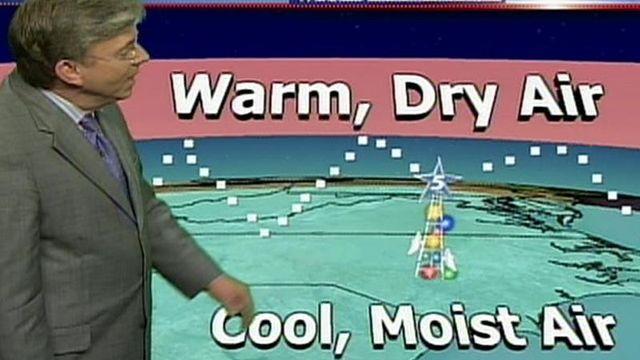Do not adjust your television set
For some folks, watching "the Big 5" this morning may have been a little more difficult than usual. Consider this email from Lou P. in Rocky Mount: "Also, this morning, we can't get the channel 5 news on the TV. Are you having technical difficulties?" Lou was not alone. We received a number of phone calls and emails from folks across the area, complaining that they could not watch WRAL overnight into this morning. The problem wasn't limited to just WRAL, either — one local cable system east of Raleigh lost at least three local TV stations for a time this morning. While it does happen that TV stations can go off the air for brief periods of time due to those dreaded "technical difficulties", that was not the case today.
Posted — UpdatedFor some folks, watching "the Big 5" this morning may have been a little more difficult than usual. Consider this email from Lou P. in Rocky Mount:
"Also, this morning, we can't get the channel 5 news on the TV. Are you having technical difficulties?"
Lou was not alone. We received a number of phone calls and emails from folks across the area, complaining that they could not watch WRAL overnight into this morning. The problem wasn't limited to just WRAL, either — one local cable system east of Raleigh lost at least three local TV stations for a time this morning.
While it does happen that TV stations can go off the air for brief periods of time due to those dreaded "technical difficulties", that was not the case today.
Nope, today, it was all Mother Nature's fault
Have you ever noticed that if you're standing in a pool, and you stick your hand under the water and look at it, that it looks bigger than it actually is? Or if you look at a stick that's half-in and half-out of the water, it appears to "bend' right where it goes into the water? If so, you've seen the impact that refraction can have on how we see. This same phenomenon can wreak havoc on TV signals and other radio waves.
Normally, the atmosphere only refracts or "bends" radio waves slightly, otherwise, passively allowing them to pass cleanly from our transmitter through to the antenna on your roof or at your cable company. These signals then get picked up by the antenna and are turned into the pictures and sounds that you and I see and hear on our television sets.
Under certain circumstances, however, the atmosphere is set up in such a way as to bend or refract these TV signals much more severely. Instead of your hand being just a little bit bigger in the pool, it would look dramatically bigger, or perhaps, even smaller!
So, instead of the radio waves bending ever so slightly, they are bent very sharply back toward the ground -- or sometimes out into space. As you might imagine, this can have some very interesting results when it comes to how we watch TV.
The end result? To quote WRAL Engineer Matt Brandes, "our signal ends up places that it’s not supposed to be and someone else’s signal can interfere with us. Also, our signal can disappear from large parts of our viewing area for several hours."
When it comes to TV signals, the results can be very mixed. Sometimes, it can be pretty cool. Once, when living in Abilene, Texas, I was able to pick up stations from Lubbock, Austin, and other "faraway" places. I had nothing more than a cheap outdoor antenna hooked up to a TV, but with the right atmospheric conditions, I was watching TV from across half the state!
Other times, like this morning, the results can be inconvenient, since you (or your cable company) may not be able to pick up our signal for hours at a time.
In some rare occasions, though, it can be potentially dangerous. Quoting Brandes again:
"Danny Hampton tells me that a few years ago the public TV station in Wilmington received a complaint from a police department in New Jersey because the DTV station in Delco was causing problems with their police radios."
The good news is that this ducting is temporary and will usually resolve itself as the atmosphere mixes up, smoothing out those sharp changes in temperature and refractive index. The bad news, however, is that there's nothing we can do about it. Transmitting more power won't help, since that extra power would simply be ducted along like the rest of the signal.
Unfortunately, even if you are getting a signal, it may not be a clean signal. If it's good ducting conditions here, it can be good conditions elsewhere, meaning other signals from other TV stations may be bleeding into ours, causing interference or other ugly picture problems. If your cable company gets our signal from an antenna, as most do, this can even cause our signal on cable to not be as clean and crisp as you expect.
By the way, I heard back from Lou again later this morning, and just as expected, WRAL came back just as good as ever. Glad to have you back!
Copyright 2024 by Capitol Broadcasting Company. All rights reserved. This material may not be published, broadcast, rewritten or redistributed.





